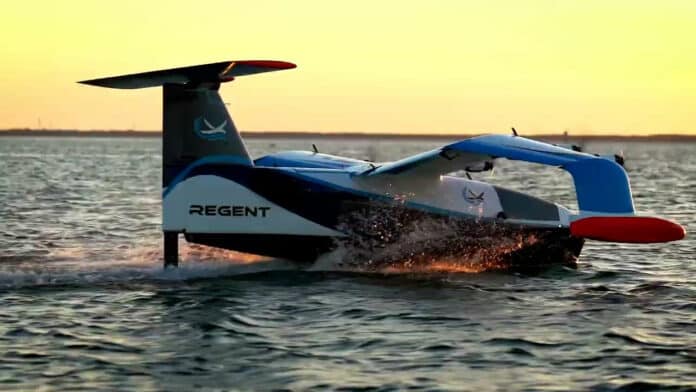REGENT, a startup developing electric flying boats, has completed the first successful series of flights with its seaglider technology demonstrator in Narragansett Bay, Rhode Island.
According to REGENT, its seaglider is the first-ever vehicle to successfully utilize three modes of maritime operation – floating, foiling, and flying – marking a major step forward in maritime transportation. The demonstrator craft is a quarter-scale model of the full-size prototype, which is expected to begin human-carrying sea trials in 2024.
“This is the next great moment in the history of human transportation,” said Billy Thalheimer, CEO, and co-founder of REGENT. “There has not been a new mode of transportation since the helicopter. These successful flights give us full confidence in our ability to apply this technology at full scale and bring seagliders to global commercial service by 2025.”
The REGENT seaglider is an all-electric wing-in-ground effect vehicle, meaning it flies low over the water to take advantage of numerous aerodynamic and operational efficiencies, enabling increased payload capability and greater range than other electric aircraft concepts. The fully-fledged Seaglider will have a wingspan of 65 feet – the demonstrator had a wingspan of 18 feet.
The seaglider operates in three modes: from the dock, the vehicle first drives on its hull like a traditional boat. As it leaves the harbor area and speeds up, it rises on its hydrofoil, a key maritime technology popularized by America’s Cup sailing competitions. The hydrofoil offers significant wave tolerance and a smooth ride as the seaglider leaves a crowded harbor. Upon reaching open water, the seaglider takes flight, retracting the foil and accelerating up to cruise speed – all while staying within a wingspan of the water’s surface.
This electric coastal transport vehicle is capable of covering distances up to 180 miles (300 km) at speeds up to 180 mph (300 km/h) with zero emissions – using commercially available batteries.
REGENT has already received $7 billion worth of orders, too, and is planning to commercialize seagliders for sustainable high-speed, regional mobility, with the first passengers boarding in 2025. It is also developing a 100-passenger seaglider, called the Monarch, capable of carrying 25,000 pounds of payload. The startup hopes to launch this larger model into service by the end of 2028.
